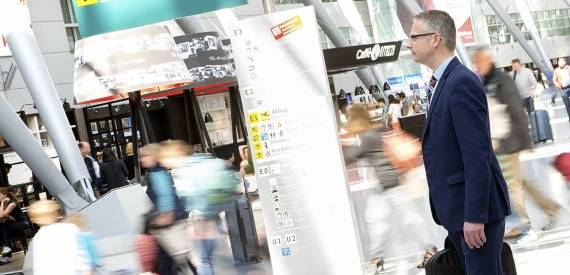Duty of Sustainability
Corporate travel amounts to 25% of the ecological footprint
Corporate travel pollutes the environment – there's no point in being secretive about it. Flights around the world on behalf of business are a major contributor to an organization's ecological footprint. After conducting research on this topic, Climate Neutral Group concluded that corporate travel represents up to 25% of the ecological footprint of large organizations. It is therefore absolutely necessary to introduce measures to address this.
Stop travelling
There are many ways to increase the sustainability of doing business. The simplest measure is to stop travelling, which is not an option in many cases. However, it is possible to evaluate your corporate travel as a whole more critically. Are there international meetings that could be held as a video conference? Are domestic or European destinations accessible by train? Are the CO2 emissions of travel compensated for? Or are environmentally fuels used? There are a number of quick wins that can be applied to ensure that travel is more sustainable.
List criteria in the travel policy
An organization can specify policy-level criteria for sustainable travel for its travel policy. Consider listing the following criteria in your travel policy:
- Limiting consideration of flights to non-stop flights thereby avoiding stopovers as much as possible.
- Flying only in economy class.
- Taking only hand luggage.
- Opting for an environmentally friendly rental car.
- Using public transportation or sharing a taxi for transport at location.
- Travelling by train where possible.
- Encouraging the use of bicycles for commuters.
All the aforementioned criteria contribute to the sustainability of travel. By focusing on such things, travel can become much greener.
Set the right example
Theoretically speaking, setting policy is a step in the right direction. To ensure results, however, it is essential that travellers and other involved employees adhere to the policy in practice. Communication is essential in ensuring that this is the case. Explain why measures were taken and what the positive consequences are. It is also important for policymakers to set the right example. How can you expect employees to get involved in ‘greener travel’ when members of the management team drive polluting cars or travel inefficiently? Everybody contributes to a more sustainable organization.
Sustainability leads to savings
Sustainable travel is often associated with increased costs. In fact, the opposite is true. By travelling smarter and therefore more sustainably, you reduce costs. Many of the aforementioned tips for sustainable criteria for travel policies already contribute to cheaper corporate travel. In addition to reducing costs, sustainability has the following benefits:
- Sustainability leads to innovation. As part of an organization, you can search for ways to travel internationally without using polluting travel options. Such policies can lead to airlines and other suppliers making extra efforts to make travel more sustainable.
- Sustainability policy increases quality. Increased critical evaluation of travel increases its quality. Travel must have a practical and well-reasoned purpose. If a particular trip does not have that, is that trip really necessary?
- Sustainability policy improves perception and reputation. Such a policy also reflects well upon employers, which in turn positively contributes to employee and client satisfaction.
I am of the opinion that companies must actively work on their Duty of Sustainability. If you share this opinion, we would be happy to help you make your international corporate travel ‘greener’. Please contact me for more information.
Source: ‘The 10 success factors for a sustainable travel policy’, Climate Neutral Group






